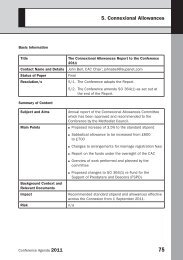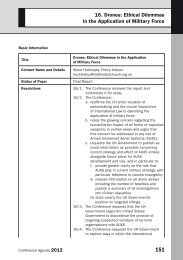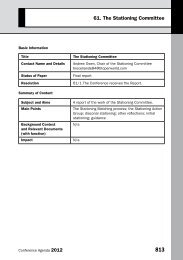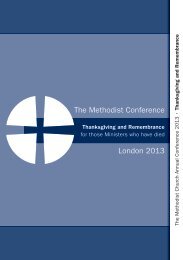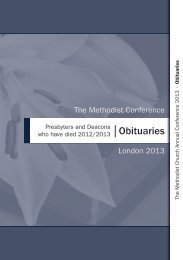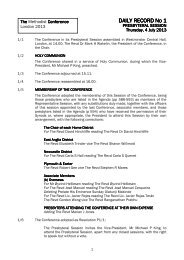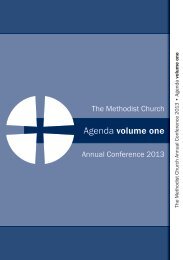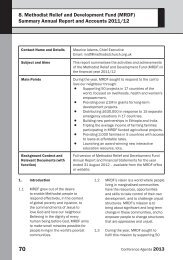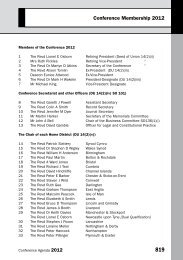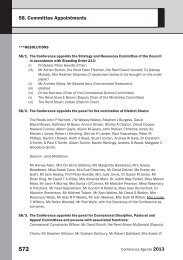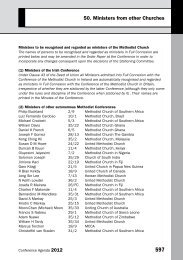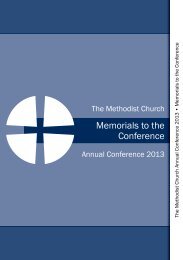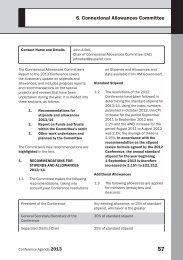Agenda Volume 3 - Methodist Conference
Agenda Volume 3 - Methodist Conference
Agenda Volume 3 - Methodist Conference
You also want an ePaper? Increase the reach of your titles
YUMPU automatically turns print PDFs into web optimized ePapers that Google loves.
57. The Fruitful Field Project<br />
and sustainable use of resources<br />
which such proposal ensures (see<br />
paragraphs 113.16-113.25 above).<br />
However, the Committee also<br />
noted carefully the concerns raised<br />
about the consolidation into one<br />
centre outlined in the consultation<br />
document. A large number of these<br />
concerns focused on the risk of<br />
confusing connexionalism with<br />
centralisation, as discussed in<br />
paragraph 181 above. A connexional<br />
committee’s submission noted<br />
that “the centralisation proposed<br />
(one single hub) is excessive. The<br />
<strong>Methodist</strong> Church is a Connexion and,<br />
as such, requires a focus on regional,<br />
District and Circuit level that a single<br />
stand-alone hub would not be able<br />
to provide... Wesley never envisaged<br />
creating just one educational base<br />
– rather he adopted both a regional<br />
approach (with libraries in Bristol,<br />
Newcastle and London) and a<br />
local approach (with the education<br />
delivered within societies).” While<br />
the Committee believes that the<br />
deployment of regional teams, the<br />
careful dispersal of work currently<br />
undertaken within the Connexional<br />
Team and the creative use of spaces<br />
will alleviate some of these concerns,<br />
the Committee judged that these<br />
concerns about the use of only one<br />
centre should be taken very seriously.<br />
221 The Committee also noted the<br />
importance of, and the demand for,<br />
the work of Cliff College. This strong<br />
affirmation of the work of Cliff College<br />
was evident in the consultation<br />
submissions, which demonstrated a<br />
unique and advanced appreciation<br />
within the <strong>Methodist</strong> Church of the<br />
work of Cliff College – appreciation<br />
found in consultation submissions<br />
from individuals, Circuits, Districts<br />
and other groupings. This affirmation<br />
is also evident in the steady but<br />
significant growth in self-funding<br />
student numbers at Cliff College<br />
over several years. It is also seen in<br />
the stable, self-sustaining business<br />
model, largely funded by fees from<br />
self-supporting students, which Cliff<br />
College has been able to develop.<br />
222 The Committee’s analysis of Cliff<br />
College also identified a number<br />
of other aspects of Cliff College’s<br />
life as a community of faith which<br />
the Committee felt nurtured and<br />
supported forms of formation,<br />
learning, training, theological<br />
education, scholarship, research and<br />
development which are currently of<br />
great benefit to the <strong>Methodist</strong> Church,<br />
and which would be of great benefit<br />
to the Discipleship and Ministries<br />
Learning Network. In particular, the<br />
Committee noted Cliff College’s<br />
historic commitment to lay formation<br />
and its mature understanding of the<br />
importance of equipping the whole<br />
people of God for discipleship and<br />
mission. The Committee also noted<br />
Cliff College’s historic and ongoing<br />
commitment both to reflection on the<br />
practice of mission and evangelism<br />
in a changing culture, and to enabling<br />
people to pioneer new forms of<br />
church appropriate for the future.<br />
The Committee also noted that<br />
Cliff College sustains a range of<br />
<strong>Conference</strong> <strong>Agenda</strong> 2012 735



